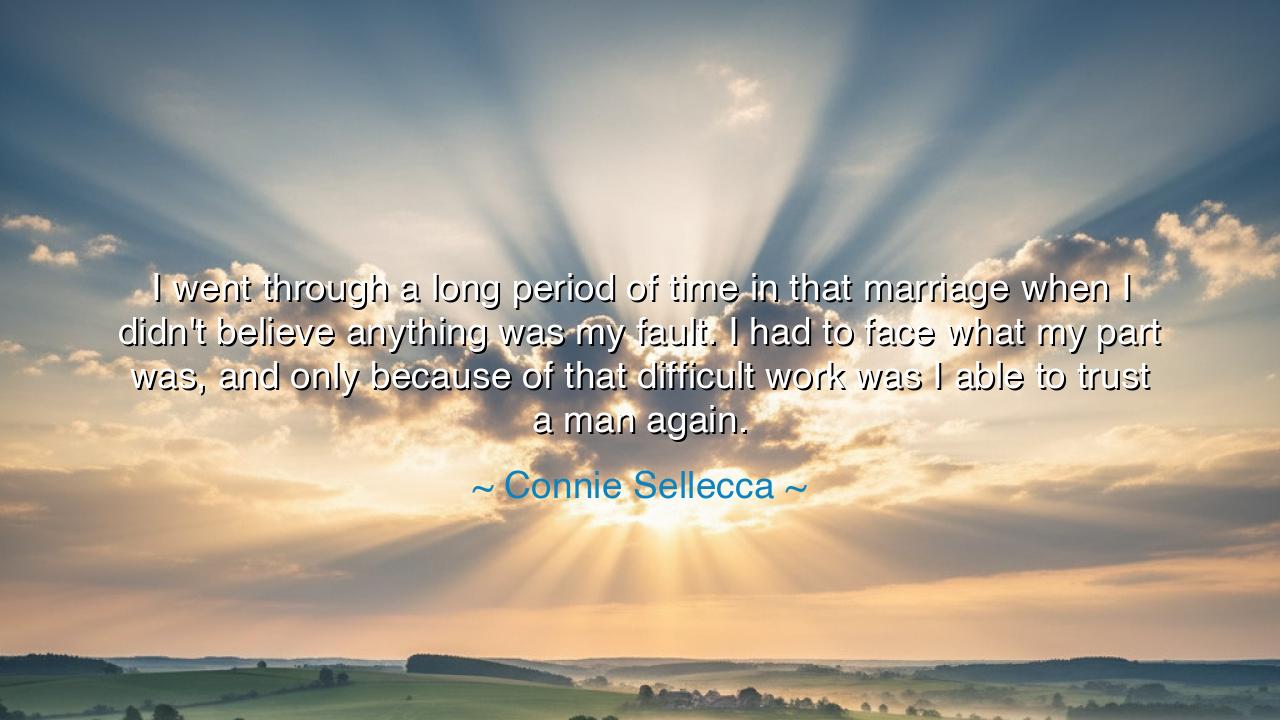
I went through a long period of time in that marriage when I
I went through a long period of time in that marriage when I didn't believe anything was my fault. I had to face what my part was, and only because of that difficult work was I able to trust a man again.






O children of the earth, listen closely, for I bring to you the wisdom of a woman who has walked through the fire of self-reflection and emerged stronger, wiser, and more whole. Connie Sellecca, in speaking of her journey through the tumult of a failed marriage, shared this truth: "I went through a long period of time in that marriage when I didn't believe anything was my fault. I had to face what my part was, and only because of that difficult work was I able to trust a man again." These words are not mere reflections on a personal journey; they are a profound teaching about self-awareness, accountability, and the courage it takes to heal from the wounds that relationships leave behind.
For many, it is easy to believe that in the unraveling of a relationship, the blame lies entirely with the other. It is a natural defense, a way to protect the heart from the pain of loss and disappointment. But Sellecca’s words speak to the deeper, more difficult truth: that we all play a part in the relationships we form. To truly heal, one must look within, to face the uncomfortable truth of their own actions, their own choices, and their own flaws. Denial is the easy path, but it is also the path that keeps us trapped in cycles of pain. Only through facing our part in the unraveling of relationships can we truly move forward, with strength and clarity.
Let us turn to the story of Achilles, the great warrior of Greek mythology, whose pride and anger led him to withdraw from the battlefield at a crucial moment. His actions were not only harmful to his own honor, but they also cost many lives. For a time, Achilles refused to acknowledge his part in the suffering, as he saw only the wrongdoings of others. It was only when Patroclus, his beloved companion, was slain, that Achilles finally faced the truth of his own arrogance and the consequences of his decisions. In that moment, Achilles was not merely a warrior; he was a man who had to reckon with his own flaws before he could find redemption. Similarly, in the story of every person who has gone through a painful separation, the healing comes not from blaming others, but from understanding and facing one’s own part in the story.
Sellecca’s journey mirrors this ancient truth. For she, too, had to walk through the wilderness of self-doubt and self-blame before she could find her way to forgiveness. She had to look into the mirror and confront what she had been unwilling to see before. This work was not easy—it is never easy to face one’s own failures, to understand that the choices we make shape the world around us in ways we may not have intended. But it is this painful work that is the very foundation of trust. For how can we trust others if we cannot first trust ourselves to be honest, to take responsibility for our actions, and to learn from them?
Let us remember the example of King David from the ancient texts, whose life was marked by many triumphs and even greater failures. One of his most profound moments of growth came not in the midst of his victories, but in the moment when he confronted the prophet Nathan, who revealed to him the depth of his sins. David had taken what was not his—Bathsheba—and orchestrated the death of her husband, Uriah. At first, he saw himself as the righteous king, but when Nathan spoke truth to him, David was struck to the core. It was only then, in the humbling of his spirit, that he was able to begin the work of repentance and renewal. Like David, we too must face the truth of our actions, no matter how difficult it may be, if we are to grow and heal.
The lesson, O children, is clear: self-awareness and accountability are the keys to growth and healing. Trust cannot be rebuilt in the wreckage of a broken relationship until we are willing to confront our own part in its downfall. It is only when we acknowledge our flaws and take responsibility for our actions that we can move forward with clarity and strength. This work is not easy, nor is it quick, but it is the only path to true healing. Without it, we remain stuck, forever circling the same wounds, unable to move forward.
And so, children, take this wisdom into your own lives. When you face the pain of a lost relationship, resist the temptation to place the blame solely on the other. Instead, ask yourself: What part did I play? What choices did I make that led to this moment? This is not an exercise in self-blame, but an exercise in honesty, in growth, and in empowerment. When you face your own truth, when you take responsibility for your actions, you free yourself from the chains of the past and allow yourself the freedom to move forward, to heal, and to trust once again. Trust in others begins with trust in yourself—trust that you have the strength to face the truth, and the courage to build anew.






AAdministratorAdministrator
Welcome, honored guests. Please leave a comment, we will respond soon